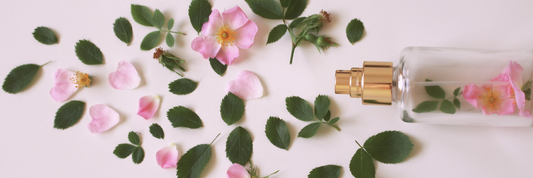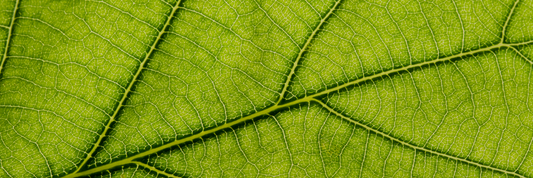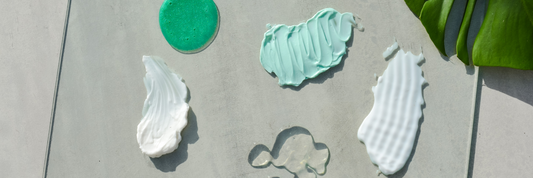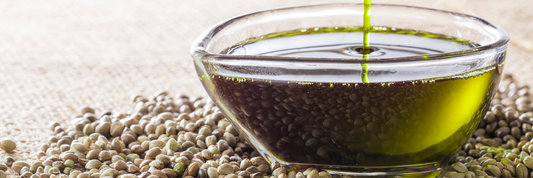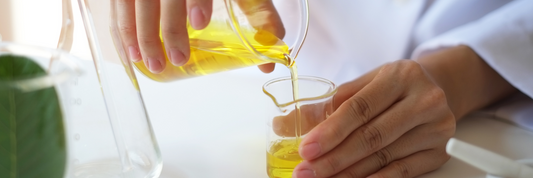
How To Make Your Own Face and Body Oils
We often get asked where is the best place to start your DIY skincare journey. Face and Body Oils are a great starting point for those who are new to making your own products. As face and body oils are 100% oil based there is no need for a preservative. It’s simply formulate, weigh, mix and pour. Alternatively, you can start off by using a recipe (see below).
Equipment Needed:

Our essentials for making bespoke face and body oils:
- Scales (0.1g is fine, however, if you think you will be making a lot of your own skincare products a 0.01g is best especially for essential oils, actives and small batches.)
- Beakers
- Glass Stirring Rod
- Glass Amber Bottles
- Droppers or Serum Pumps
- Pipettes
Choosing Your Carrier Oils

Research - get to know your oils, read up on them, experiment with them. We have over 100 carrier oils, here are a few to get you started – if you think face oils are heavy try adding 30-50% squalane - it is one of our favourite ingredients in a face oil:
Oils by skin type:
Dry - Cacay, Rosehip, Camellia, Sweet Almond, Macadamia, Avocado, Squalane
Anti-ageing - Cacay, Rosehip, Camellia, Squalane, Kukui, Pomegranate
Normal - Avocado, Argan, Apricot, Camellia, Jojoba, Squalane
Oily - Jojoba, Squalane, Evening Primrose Oil, Sunflower Oil, Safflower Oil, Tamanu
Using and Selecting Essential Oils

When using essential oils in your face and body oils you need to adhere to the skincare guidelines. Please note there are essential oils that are skin irritants (clove, cinnamon etc) so if using essential oils please make sure you research which oils are safe to use on the skin.
Face: < 0.5%
Body: < 1%
Example:
100grams face oil - Use up to 0.5grams of essential oil or approx. 10 drops max.
50grams face oil - Use up to 0.25grams of essential oil or approx 5 drops max.
Some of our favourites include – Frankincense, Neroli, Rose, Carrot Seed, Rose Geranium, Sandalwood, Everlasting, Ylang Ylang
Adding an antioxidant

Two main ways to use antioxidants in face oils:
-To help protect the fats and oils in our formulation from rancidity
-As active ingredients to protect the skin against the effects of oxidation
The two we recommend are Vitamin E Mixed Tocopherols or Rosemary Antioxidant
Check out our blog post on Antioxidants, we recommend adding 0.5-1% to the formula.
How to create a formula
When creating your formula, we recommend writing it up as a 100g batch first - no matter what size you want to ultimately make. This way, the quantity of each ingredient will neatly become a percentage amount which you can then apply to larger or smaller sized batches. In the table below we created a 100g recipe (First 2 columns) then transposed the weight of each ingredient to a percentage amount (Third column) which we then applied to smaller 50g and 30g batch sizes (Fourth and Fifth columns). For example, we decided to use 40g of Squalane which we know is 40% of 100g. To work out how much to include in a 50g batch we simply need to work out 40% of 50g, which is 20g.
|
Face Oil |
Amount |
% |
50 grams |
30 grams |
| 40g |
40% |
20g |
12g |
|
| 30g |
30% |
15g |
9g |
|
| 28.6g |
28.6% |
14.3g |
8.58g |
|
| 1g |
1% |
0.5g |
0.3g |
|
|
Essential Oil - Rose Absolute |
0.3g (approx. 6 drops) |
0.3% |
0.15g (3 drops) |
0.09 |
|
Essential Oil - Carrot Seed |
0.1g (approx. 2 drops) |
0.1% |
1 drop |
0.03g |
| Total | 100g | 100% | 50g | 30g |
Fun part
So now it’s simply a matter of weighing everything out - you can either weigh each item separately or use the tare function on the scales each time you have added an ingredient - caution though if you add too much you can’t take it back! This is where a pipette or eye dropper can come in very handy.
Once it’s all weighed out give it a good stir, pour into your desired bottles and pop on a fancy label.
Here's a some recipes to get you started:
Cranberry Face Oil
AfterSun Skin Restore Oil Elixir
NZ Hemp Seed Face Oil
Bakuchiol Face Oil
CoQ10 Anti-Ox Face Oil
Kiwifruit Seed Eye Oil
Luscious Lime and Vanilla Body Oil
Copyright, PureNature. This information is intended for personal use of PureNature customers and may not be reproduced, shared or used for commercial purposes without written consent.










